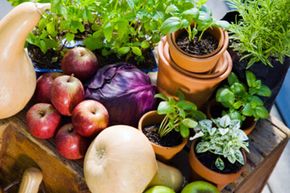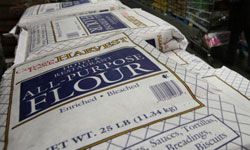Going organic at the market has gotten a lot of press in recent years. To help create a standard and ensure that "organic" foods are what they claim to be, the U.S. Department of Agriculture (USDA) has been tasked with enforcing the rules and guidelines instituted by the Organic Foods Production Act (OFPA) of 1990. The OFPA established specific minimum standards for foods sold as organic.
U.S. certified organic products carry a round, green and white, USDA Certified seal. The seal is visible on product packaging, or in the case of fresh produce, on nearby marketing materials. To be able to carry the USDA Certified seal on their goods, farmers and importers must submit to periodic inspections, maintain accurate records and meet a number of other rigorous standards.
Advertisement
For example, they cannot use synthetic substances in the production of their crops unless those substances have been evaluated, approved and added to the list of National Organic Program Standards (NOPS). They can't plant organic crops on land that has been treated with substances banned by NOPS within three years prior to converting to organic production practices. Livestock must be fed exclusively organic grains, too. There are a number of standards, and they're constantly being updated and reviewed by a panel of industry experts collectively known as the National Organic Standards Board (NOSB). The NOSB keeps the Secretary of Agriculture advised about matters pertaining to organic production.
For small organic farmers who generate less than $5,000 in annual sales, the standards are less rigorous than for larger producers. The result for all organic producers, though, is more recordkeeping and oversight. If all this sounds time consuming and costly, it can be. The extra time and bureaucracy contributes to the cost of organically produced food, but it also helps to insure that foods sold as organic are being accurately marketed.
Organic foods are more expensive than mass produced food, but how much more expensive can vary from season to season, and region to region. The USDA estimates that organically-produced food can cost anywhere from 10 to 30 percent more than conventionally mass-produced food. There are a number of reasons for this beyond government intervention. Because organic food is typically produced in relatively small quantities, it's more difficult for organic producers to take advantage of the economies of scale that help mass producers bring large crops to market at prices that attract consumers. Organic crops are less protected from diseases and insect predators, too, which results in more substantial losses during the course of a growing season.
If the trend toward more environmentally-friendly agricultural practices continues, there may well be a shift toward more organic production methods among large producers. Public sentiment may play a big part in mainstreaming organic options at the market, too. If the demand for organic products increases in the future, eventually prices will begin to drop, making organically grown food more attractive to price-conscious, as well as health conscious consumers.
Advertisement


